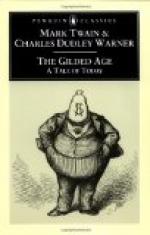“Thank God, I’ve struck it at last!”
He lit a candle and ran into the tunnel; he picked up a piece of rubbish cast out by the last blast, and said:
“This clayey stuff is what I’ve longed for—I know what is behind it.”
He swung his pick with hearty good will till long after the darkness had gathered upon the earth, and when he trudged home at length he knew he had a coal vein and that it was seven feet thick from wall to wall.
He found a yellow envelope lying on his rickety table, and recognized that it was of a family sacred to the transmission of telegrams.
He opened it, read it, crushed it in his hand and threw it down. It simply said:
“Ruth is very ill.”
CHAPTER LXIII.
It was evening when Philip took the cars at the Ilium station. The news of, his success had preceded him, and while he waited for the train, he was the center of a group of eager questioners, who asked him a hundred things about the mine, and magnified his good fortune. There was no mistake this time.
Philip, in luck, had become suddenly a person of consideration, whose speech was freighted with meaning, whose looks were all significant. The words of the proprietor of a rich coal mine have a golden sound, and his common sayings are repeated as if they were solid wisdom.
Philip wished to be alone; his good fortune at this moment seemed an empty mockery, one of those sarcasms of fate, such as that which spreads a dainty banquet for the man who has no appetite. He had longed for success principally for Ruth’s sake; and perhaps now, at this very moment of his triumph, she was dying.
“Shust what I said, Mister Sederling,” the landlord of the Ilium hotel kept repeating. “I dold Jake Schmidt he find him dere shust so sure as noting.”
“You ought to have taken a share, Mr. Dusenheimer,” said Philip.
“Yaas, I know. But d’old woman, she say ’You sticks to your pisiness. So I sticks to ’em. Und I makes noting. Dat Mister Prierly, he don’t never come back here no more, ain’t it?”
“Why?” asked Philip.
“Vell, dere is so many peers, and so many oder dhrinks, I got ’em all set down, ven he coomes back.”
It was a long night for Philip, and a restless one. At any other time the swing of the cars would have lulled him to sleep, and the rattle and clank of wheels and rails, the roar of the whirling iron would have only been cheerful reminders of swift and safe travel. Now they were voices of warning and taunting; and instead of going rapidly the train seemed to crawl at a snail’s pace. And it not only crawled, but it frequently stopped; and when it stopped it stood dead still and there was an ominous silence. Was anything the matter, he wondered. Only a station probably. Perhaps, he thought, a telegraphic station. And then he listened eagerly. Would the conductor open the door and ask for Philip Sterling, and hand him a fatal dispatch?




